|
|
|
Sort Order |
|
|
|
Items / Page
|
|
|
|
|
|
|
| Srl | Item |
| 1 |
ID:
128397
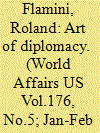

|
|
|
|
|
| Publication |
2014.
|
| Summary/Abstract |
Early in October 2013, a group of high-ranking Greek officials, including Prime Minister Antonis Samaras, came to Washington for the opening of a major art exhibition from their country at the National Gallery of Art. But the black-tie event and the press conference to inaugurate the show, "Heaven and Earth: Art of Byzantium from Greek Collections," were both canceled because of the government shutdown. As a result, a party of angry Greeks left for home muttering darkly about fearing Americans when you bear them gifts. The Greeks were not even allowed a private visit to the exhibition in which virtually every precious icon, ancient manuscript, and piece of mosaic had been loaned by museums and institutions in their country.
|
|
|
|
|
|
|
|
|
|
|
|
|
|
|
|
| 2 |
ID:
056599
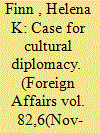

|
|
|
| 3 |
ID:
167332
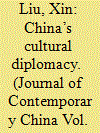

|
|
|
|
|
| Summary/Abstract |
This article explores the prominent features of China’s state-led campaign of cultural diplomacy. Through multiple comparative case studies of its flagship project of the Confucius Institute (CI), it aims to identify and contextualise the various variables affecting its effective operation. It finds that this dependent variable is mainly determined by the independent variable of the CI’s ability to localise its product and process to suit different target audiences, along with a number of extraneous variables, including ideology, nationalism and the media environment in the destinations. People-to-people interaction is also an important mediator that contributes to facilitating mutual understanding. All the variables and the complexity of their inter-relations constitute the Chinese characteristics and are charted out in a diagram.
|
|
|
|
|
|
|
|
|
|
|
|
|
|
|
|
| 4 |
ID:
148734


|
|
|
| 5 |
ID:
102941
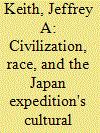

|
|
|
|
|
| Publication |
2011.
|
| Summary/Abstract |
Offering a fresh reading of the U.S. Japan expedition (1853-1854), this article analyzes extant accounts written by Commodore Perry and his crewmen with an eye toward exhibiting how they perceived the Japanese as well as how their perceptions informed the expedition's cultural diplomacy. To precisely interpret the statements made by these men, this article makes a distinction between observations regarding Japanese civilization and the Japanese "race." Sometimes at odds, these two criteria for understanding the Japanese interlinked in the crewmen's thinking about Japan, since both chauvinism about the supremacy of Western civilization and racism provided them with a sense of superiority and, if necessary, a rationale for domination over the Japanese. These sailors' musings about civilization and race highlight the salient elements of their worldview, while the Japan expedition's use of cultural instruments-as varied as parades, technological expositions, and musical performances-revealed Perry and his crewmen's biased perceptions of the Japanese.
|
|
|
|
|
|
|
|
|
|
|
|
|
|
|
|
| 6 |
ID:
141946
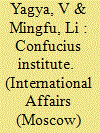

|
|
|
|
|
| Summary/Abstract |
IN THE TWENTY-FIRST CENTURY, the outlines of international relations have changed to a great extent and continue changing under the impact, in particular, of "soft power" that different countries apply to achieve their aims on the world scene. Having learned that its interests in the world community cannot be protected by military might alone, Beijing turned to "soft power"; today, it is used on a grand scale.
|
|
|
|
|
|
|
|
|
|
|
|
|
|
|
|
| 7 |
ID:
148502
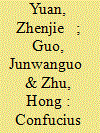

|
|
|
|
|
| Summary/Abstract |
The majority of Anglophone literature tends to portray Confucius Institutes as playing a successful role serving China’s interests in its foreign collaborations. So far, the threat of this institution has been largely stereotyped and even taken for granted. Few scholars question the influence and capacity of the institution on both global and local scales. Relying on cartograms, correlation and national image analyses as well as qualitative studies, this article examines the influence of Confucius Institutes as the institution globalized and localized. This article reports three main findings: (1) the geopolitical influence of Confucius Institutes is uneven in different regions and they are engaged in an ongoing process of geopolitical construction; (2) analyses of correlation with China’s national image show that not only does the influence of the institution vary in regions but also that the project could have a negative impact on bilateral cooperation, suggesting that, contrary to popular thinking, Confucius Institutes have not had a positive impact on China’s global interests; and (3) the capacity of the institutes in everyday operations is systematically limited, reflecting China’s inexperience in managing this global cultural network. Confucius Institutes are generous in making economic concessions but are hesitant during political negotiations, which can be said to mirror China’s patchy performance in economic and political reform.
|
|
|
|
|
|
|
|
|
|
|
|
|
|
|
|
| 8 |
ID:
179889
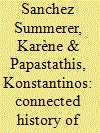

|
|
|
|
|
| Summary/Abstract |
The special issue critically explores, at a micro and macro level, the structural role and religious, cultural and political interactions of the Greek-Orthodox, Melkite and Syriac communities in late Ottoman and Mandate Syria and Palestine. It seeks to identify archival gaps, and to link the study of the micro-scale level of everyday cultural and religious life to the macro-narratives of global change affecting Christian communities, in a connected perspective, via dynamics of cultural and religious personal and institutional interactions. The Christian communities, both as institutions and lay bodies, are of special interest for the field of Levantine studies, since they were placed at the heart of the local power game, expressing the quest for social emancipation, while also keeping close links with diplomatic actors, colonial institutions, and foreign religious agents. The research presented lies on the idea that the communities in focus were inextricably linked, being actors operating within the same multi-ethnic periphery, having the same legal status, and being in contact to foreign agents, while at the same time politically dependent to the centralized ottoman and mandatory authorities.
|
|
|
|
|
|
|
|
|
|
|
|
|
|
|
|
| 9 |
ID:
167545
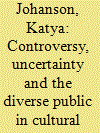

|
|
|
|
|
| Summary/Abstract |
In the past few years, foreign policy tensions between China and Australia have become especially fraught. In some cases, this political situation manifests in the very diplomatic initiatives that were funded to help ease relations. This article considers a case study of a theatrical collaboration in the context of contemporary Australia–China relations to interrogate the value of our understandings of and evaluation frameworks for public diplomacy. This article argues that theories of cultural diplomacy and assessments of initiatives need to consider the multiple and competing objectives, diverse publics and controversial receptions that may be the outcomes of cultural diplomatic initiatives. It demonstrates this complexity in relation to Australia–China relations. Taking a cultural diplomatic initiative that sought to increase positive association for Chinese culture in the Australian public as a case study, it illustrates the range of differences that can be found amongst stakeholders, and the different roles that may be ascribed to cultural diplomacy. These interests, including those of different artistic and political stakeholders, as well as differences in the publics involved, are best segmented not only according to nation but also to subculture.
|
|
|
|
|
|
|
|
|
|
|
|
|
|
|
|
| 10 |
ID:
149725
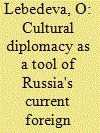

|
|
|
|
|
| Summary/Abstract |
This obviously also applies to Russia's current cultural diplomacy. Yevgeny Shmagin, Deputy Director of the Department on Cultural Affairs and Ties with UNESCO of the Russian Ministry of Foreign Affairs, underscores in his article "Culture and Diplomacy" published in International Affairs the importance of cultural diplomacy in implementing the state's foreign-policy strategy, maintaining, in particular, that "the union of diplomacy and culture has at all times served Russia's national interests, over and over again demonstrating its vitality at different stages in our history. It was cultural diplomacy with its specific set of instruments and methods to influence public opinion that was able to essentially dissolve the ice of hostile and sometimes openly biased attitudes with regard to our country during its Soviet period, mitigating the impact of various negative tendencies of political and ideological nature. During the formation of new Russian state, cultural initiatives once again helped strengthen the country's international prestige, its reputation, demonstrate the Russian society's openness, serve as an evidence of Russia's revival, and its development as a free and democratic state."
|
|
|
|
|
|
|
|
|
|
|
|
|
|
|
|
| 11 |
ID:
129089
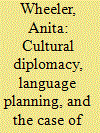

|
|
|
|
|
| Publication |
2014.
|
| Summary/Abstract |
As China's economic and political presence in Africa increases, so does the need for its government to maintain a favorable image with African publics. Borrowing theories of soft power diplomacy and language planning, this paper analyzes, from the perspectives of African and Chinese policymakers, the impact of the Confucius Institutes on higher education in Africa and its intersections with language planning and cultural diplomacy. An empirical case study at the University of Nairobi Confucius Institute shows that policymakers and administrators anticipate that a competent group of Kenyans with Mandarin language skills will be able to engage with Chinese people and Chinese-owned companies on the ground in Kenya. However, Chinese diplomats are more concerned with China's image and achieving its political and economic interests in Kenya than with effective cultural exchange and language instruction.
|
|
|
|
|
|
|
|
|
|
|
|
|
|
|
|
| 12 |
ID:
058654
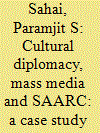

|
|
|
|
|
| Publication |
Jul-Sep 2004.
|
|
|
|
|
|
|
|
|
|
|
|
|
|
|
|
| 13 |
ID:
068324
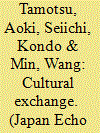

|
|
|
| 14 |
ID:
129676
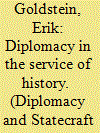

|
|
|
|
|
| Publication |
2014.
|
| Summary/Abstract |
In 1898 Governor William Bradford's early history of the Plymouth Colony was returned to Massachusetts through diplomatic, and sub-diplomatic, efforts. This marked an important stage in the growing Anglo-American rapprochement. It also illustrates an early episode of Cultural Diplomacy, as well as of repatriation of a cultural object.
|
|
|
|
|
|
|
|
|
|
|
|
|
|
|
|
| 15 |
ID:
188639
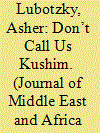

|
|
|
|
|
| Summary/Abstract |
During the 1960s, several hundreds of African students attended long-term academic or vocational programs in Israel. For Israel, offering higher education to Africans was considered a way to strengthen its influence in decolonizing Africa, while for African states, it was a means to gain vital technical expertise and reduce reliance on ex-colonial powers or the Cold War superpowers. African international students, however, were not merely pawns in this larger international political game. Responding to everyday racism and influenced by radical and Pan-Africanist ideas of the turbulent sixties, these students became active participants and commentators within Israeli society. They employed diverse strategies to promote anti-racist and anti-colonial causes, engaging in political activism at levels that were uncommon in the Israeli student social scene. By doing so, African students in Israel contested local prejudices about Africa and Africans and taught the hosting society important lessons on political awareness, broad-mindedness, acceptance, and racial tolerance. This history tells of understudied aspects of the global Black-Jewish relations in the 1960s. It also provides a novel perspective on Israeli society – one that surpasses the well-discussed Jewish-Arab or Ashkenazi-Mizrahi divisions – and contributes to the scholarly understanding of the meanings and manifestations of Blackness in Israel.
|
|
|
|
|
|
|
|
|
|
|
|
|
|
|
|
| 16 |
ID:
124729
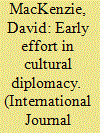

|
|
|
|
|
| Publication |
2013.
|
| Summary/Abstract |
The Canadian Co-operation Project (CCP) was one of the more unusual episodes in the economic and cultural relationship of Canada and the United States. Conceived between the federal government and the Hollywood film industry, the 1948 agreement called on Hollywood to produce more films in Canada and to make efforts to promote American tourism in Canada. The paper argues that the CCP was less the surrender to Hollywood than is generally understood and more an early example of cultural diplomacy in which the Canadian government used cultural relations with the United States for its own ends, primarily the promotion of tourism in Canada
|
|
|
|
|
|
|
|
|
|
|
|
|
|
|
|
| 17 |
ID:
173218
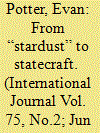

|
|
|
|
|
| Summary/Abstract |
If culture is the lynchpin of public diplomacy, then the Canada Council for the Arts (the Council) has had an important role in projecting Canada’s international image, identity, and values beyond its borders for over 60 years. This article explores the evolution of the Council’s role in Canada’s cultural diplomacy, from its birth as a result of the Massey Commission’s recommendations to its growing international role in projecting Canada’s diversity in a contemporary international context. The article argues that the Council’s growing international role, one that promotes cultural freedom, will strengthen Canada’s foreign policy and may portend a unique form of “bottom-up” Canadian cultural statecraft that is distinct from the traditional “top-down” forms of political and economic statecraft.
|
|
|
|
|
|
|
|
|
|
|
|
|
|
|
|
| 18 |
ID:
192981
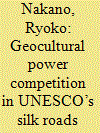

|
|
|
|
|
| Summary/Abstract |
Since Chinese President Xi Jinping announced the Belt and Road Initiative in 2013, China has increasingly engaged in UNESCO’s Silk Roads project. China’s emphasis on its western routes signals its strategic interest in the reconstruction of its historical connections that matches China’s global networking in Eurasia, the Middle East, and Europe. However, whether China will successfully reformulate the international visions of the past, present, and future for its benefit remains an open question. This article focuses on the responses from Japan and South Korea, both of which hold critical positions as the owners of eastern Silk Roads heritage and the funders of UNESCO’s Silk Roads heritage studies and World Heritage nomination assistance. Extending the conceptual framework of memory infrastructure to the study of heritage politics and diplomacy highlights the competitive aspect of a transnational heritage project in shaping and reshaping historical and contemporary geographical landscapes.
|
|
|
|
|
|
|
|
|
|
|
|
|
|
|
|
| 19 |
ID:
112624
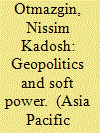

|
|
|
|
|
| Publication |
2012.
|
| Summary/Abstract |
Japan's cultural policy and cultural diplomacy in Asia has changed dramatically over the past one hundred years, from actively introducing and imposing Japanese culture during its empire-building period, to essentially avoiding the promotion of Japanese culture in Asia for most of the postwar period due to fears of being seen once again as engaged in cultural imperialism, and more recently, to supporting and encouraging the export of Japanese contemporary culture and lifestyle in order to attain "soft power." Looking at the fluctuations in Japan's cultural policy over these three periods allows us to understand how Japan has used cultural policy to further its geopolitical goals and more basically how it has viewed the role of "culture" in the context of its relations with Asian neighbors. In a broader sense, the Japanese experience shows that cultural policy, even when inward-looking, is not isolated from a country's geopolitical position and its ambitions in the world, regardless of the political system under which it operates.
|
|
|
|
|
|
|
|
|
|
|
|
|
|
|
|
| 20 |
ID:
104318
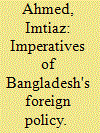

|
|
|
|
|
|
|
|